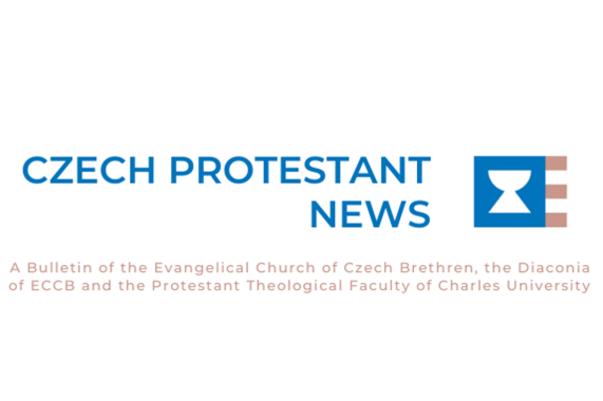Ecumenical Bulletin 52 – Easter 2021
Editorial
In the previous edition of our Bulletin, issued around Christmas, we wrote about several significant historical anniversaries. This time is different. I can only think of one anniversary, a rather paradoxical one: it has been almost precisely a year since we have been shut, for the most part at least, in our homes, trying to avoid the uninvited guest, COVID-19. Unfortunately, the situation doesn’t seem to be improving, the numbers don’t spark too much hope; sometimes things seem to be looking up, but then there is another step back, it’s a bit like a see-saw…
We try to live a life as “normal” as possible, but it is not easy. We don’t get to see our loved ones, we fear the passers-by, and meeting a friend for a coffee or a beer seems like a scene from a pleasant dream.
Ecumenical Bulletin 52 – Easter 2021
What are the benefits of these times? Surely each bad era has a positive side to it. Life has not come to a halt! Yes, many people are dying and it hurts, but so many of us have recovered and children are being born as if nothing was happening at all! In addition, fortunately enough, good books are being published, so there is always something to read, let us be grateful for that! And not only books, also great films, theatre plays – it is good news that people refuse to give in to the mess created by the virus. It is not all bad.
To mention at least some of what you will read about in the new edition of the Bulletin, I would like to draw your attention to the Pastoral Brothers: two young Protestant ministers that have been active on YouTube, among other places. I am sure the two of them have also 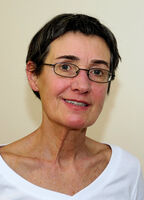 refused to give in to the atmosphere of fear. Ministers and actors at the same time, they bring hope, joy and, what’s more, they have managed to get the atheist minority to be able to relate to them! That is really quite something. So take a look at them. And let us all hold on to the hope that comes from above.
refused to give in to the atmosphere of fear. Ministers and actors at the same time, they bring hope, joy and, what’s more, they have managed to get the atheist minority to be able to relate to them! That is really quite something. So take a look at them. And let us all hold on to the hope that comes from above.
On behalf of the Editorial Board,
Jana Plíšková
EVANGELICAL CHURCH OF CZECH BRETHREN (ECCB)
 P. O. Box 466, Jungmannova 9,
P. O. Box 466, Jungmannova 9,
CZ 111 21 Praha 1, Czech Republic
Tel: (+ 420) 224 999 215(216); Fax: (+ 420) 224 999 219
E-mail: ekumena@e-cirkev.cz
Web page: www.e-cirkev.cz
The foundations of the Evangelical Church of Czech Brethren stem from the Hussite church (1431–1620) and the Unity of the Brethren (1457–1620). The Evangelical Church of Czech Brethren (ECCB) was established in 1918, when the Lutheran and Calvinist wings of the local protestant creed were united in one. Their existence, however, had not been legal until Joseph II issued his Patent of Toleration in 1781, following a long and tough anti-reformation campaign that began in 1620. Even after issuing the Patent of Toleration, Protestants still had to face many restrictions, which would only be lifted following the Protestant Patent of 1861.
At the time of its establishment, the ECCB had 250,000 members, the number increased to 325,000 in 1938. Today, the church is divided into 14 seniorates and has a total of approximately 250 congregations and 100,000 members. The church is headed by a six-member Synodal Council, elected for a six-year period, represented by the Synodal Senior and Synodal Curator.
Remembering Sváťa Karásek
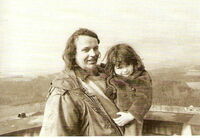 Svatopluk Karásek (18 October 1942 – 20 December 2020), a pastor of the ECCB who influenced Czech Protestantism in a fundamental way, passed away recently. He had an astonishing capacity to be his natural self in environments as different as underground culture, the church, and the establishment.
Svatopluk Karásek (18 October 1942 – 20 December 2020), a pastor of the ECCB who influenced Czech Protestantism in a fundamental way, passed away recently. He had an astonishing capacity to be his natural self in environments as different as underground culture, the church, and the establishment.
In 1981, he came to Zurich, Switzerland. He was not exactly a typical pastor for the area. He had long hair, a stout figure and laughed very loudly. He would often pick up the guitar. He played badly, but without restraint. The secret police had driven him out of Czechoslovakia. Their aim at the time was to do so with as many opponents of the totalitarian regime as possible, using never-ending interrogations, house searches, kidnappings and beatings. Sváťa finally gave in to this pressure and left, although he was not happy to do so, especially with regard to his family. His wife, Stáňa, a mother of three, had a weak heart, and the accumulating stress was definitely cause for serious worries.
The secret police had reason to celebrate. They managed to get rid of a distinctive personality: in word and in deed, Karásek was giving many people around him the courage to act freely. A few years later, it turned out that his work and the ideas he stressed were more powerful than the power of the seemingly omnipotent totalitarian state.
Art and the community
Karásek was born into an anti-communist family. His father, originally a clerk, then a workman, was taken into custody in the 1950s for political reasons. Concerning his mother, Sváťa used to say he inherited a sense of humour and an urge to always play the clown after her. This meant that during his school years, he often got bad grades for misbehaviour and he was expelled a couple of times. His sources of spiritual inspiration included the Beat generation and the Bible, especially the books of the New Testament, which he would often reach for not primarily because it was nearly forbidden literature at the time, but simply because the Biblical message was something he could truly relate to. He became familiar with Christianity already in his early childhood, as his mother took him to church on Sundays.
His journey to studying at the Comenius Theological Faculty (as it was called back then), the only Protestant theological faculty in the country, was not an easy one. The state authorities did not want to let the young non-conformist study anything other than the Agricultural University, justifying this with the fact that his high school education was in the field of gardening and viniculture. For a while, therefore, Karásek started working as a miner in the Kladno mines, then he tried the entrance exams again in 1964 and he was admitted. The fact that the Dean of the Faculty, J. L. Hromádka, who was a respected man, put in a good word for Sváťa, probably played a role. This outstanding theologian, a holder of the Lenin prize, had very good relations with the communist regime.
Sváťa Karásek brought a new perspective into the Faculty environment. The students and the teachers alike were striving, above all, to be able to keep studying and researching in the field of theology; the more courageous ones were also trying to engage in a critical dialogue with the regime. With Karásek, however, an artistic spirit started to have more and more influence at the Faculty. His enthusiasm, straight-forwardness, his tall figure, his slow, as if always well-considered speech, and above all his unwavering self-confidence helped him create an aura of authority. As far as the form is concerned, he really didn’t come up with anything new. The country had already developed a strong tradition of genres on the verge of theatre, cabaret and political folk singing during the pre-war era, and these were experiencing a renaissance during Karásek’s university years. Karásek had already tried theatre plays, playing in a band, he had been setting poetry to music since high school as well as writing his own poems. Many of his fellow students from the faculty and outside of it wanted to join in and try similar things. However, it was clear Karásek was more interested in creating artistic communities and passing on the message of the Gospel than in achieving a perfect artistic performance.
The freest period
Given his family background, he never believed in communism or in socialism. Until 1968, however, he did not feel the need to protest against the regime in Czechoslovakia. This changed with the invasion of the Warsaw Pact armies, and also following a family tragedy. Sváťa and his wife Stáňa were expecting the arrival of their first baby twins. They were born premature, there was no incubator at the hospital and the twins died of hypothermia on their way to another hospital, because there was no heating in the ambulance. When a church official tried to comfort Karásek with pious words about „God’s will“, the angry young minister answered that it was a matter of a dysfunctional state much rather than of God’s will. However, the young couple did not let this tragedy break them. One year later, their daughter Adélka was born.
At that time, the family was already working in Hvozdnice near Prague. Karásek’s pastoral work was clearly successful: the local community quickly started growing. This, however, was not something the communist authorities liked to see, which was why Karásek was forced to move to North Bohemia, near the borders. There, the situation repeated itself. A minister with long hair who played the guitar and owned a Jeep, which was very unusual at time, was like a magnet attracting the local youth. This led to Karásek losing his state permission to serve as a minister. He simply wasn’t allowed to work as a minister any longer. He and his family moved to the abandoned Houska castle in a romantic region of rocks and ravines. There, he worked as castle manager and administrator of the book depository. This was the freest period of his life, as he later recalled.
At Houska, he was hidden away from the public eye. However, friends from near and far would come and visit, and even complete strangers sought his presence. A new community was forming and Karásek started preparing sermons in the form of songs, because he didn’t find it appropriate to be preaching around a campfire. Singing and playing the guitar, on the other hand, was very fitting, even though Karásek was a bad singer and an even worse guitar player. He used American spirituals as the basis for his songs, but he wrote his own lyrics. He knew how to play with words, used the onomatopoeia of the language, but always made sure his message remained clear and comprehensible. People were sharing amateur tape recordings of his songs.
„I don’t know which recording it was, perhaps the twentieth, the sound was muffled, as if it were coming from the bowels of the earth. His voice was incredibly deep, kind of hypnotic. I couldn’t get away from the cassette player.“ This is how Michal Plzák, an atheist student at the time and currently a pastor, describes his first encounter with Karásek’s music. Karásek was the one who inspired him to study theology, a choice that involved some risk in a communist state. „In his approach to life and in his words, he presented Christianity as something that was not stupid, obsolete or laughable. He showed us a credible, stimulating alternative that had the potential to create a living, spontaneous community. This alternative drew dozens, hundreds of people into the church – some for a while, some for longer, some for good.“ The orderly-mannered Czech Protestantism thus began seeing a new influx of non-conformist youth. According to Plzák, however, the „church was getting used to this and perhaps even started to be grateful“.
It was especially his popularity with young people that made Karásek such an important enemy in the eyes of the regime that he was summoned to trial and sentenced together with the community around the legendary underground music group, the Plastic People of the Universe, which he had also hosted at the Houska castle. History sees this trial with young people as a key event leading up to the establishment of the Charter 77 movement, which, headed by Václav Havel, demanded that human rights be respected in Czechoslovakia.
Karásek remained faithful to underground culture all his life. His approach to life, however, went far beyond the ideas of underground. He used its formal, aesthetic part, perhaps also contributed significantly to creating it and he was definitely one of the visual symbols of this cultural movement. He participated in the life of underground communities. Following the example given by Jesus, he understood people with problems, people on the edge of society. Nevertheless, he never had any sort of partiality for nihilism or lowness, coarseness. His whole personality was focused on movement in the very opposite direction. In his sermons, published under the humiliating title Boží trouba (God’s Fool, Kalich, Torst, 2000), we repeatedly read words of faith in good will and in God’s guidance, with a final aim that is often referred to using the metaphor of a big, joyous feast that everybody is invited to. In this regard, Karásek’s faith was quite simple and firm. He did not hesitate to contest those passages of the Gospel that claimed otherwise.
At St. Salvátor
After the revolution of 1989, he spent a few years travelling back and forth between Prague and Switzerland, where part of his family settled for good. In 1997, he became minister at the Prague St. Salvátor church, one of the most important churches of the Czech Protestant tradition. He was also active in politics. He was a Parliament deputy for four years, then the Government’s human rights commissioner for two years, and he was a member of the local authority for Prague 1 until 2018. Following the sudden, unexpected death of his wife Stáňa, he remarried. They brought up two children with his wife Pavla.
The final years of his life were affected by a brain stroke, after which he lost the ability to speak and had to learn all over again. This must have been a terrible blow for somebody who had been preaching all his life. Surprisingly though, Karásek would always talk about the advantages that this situation brought – he was no longer focused on being an intellectual, he lost the urge to argue with people, his quick temper was gone. His faith in a good end remained unshattered. As he preached in one of his Advent sermons: „The Peace of our Lord, the kingdom of justice and freedom, that is not a long-lost cause. It is – believe it or not – our future, it is God’s promised land, […] it is God’s future, coming to meet us.“
Adam Šůra
We should have an understanding of the complexity of interpersonal relationships and the diversity of environments. Interview with Pavel Hanych, the new Head of the Ecumenical and International Relations Department of the ECCB Central Office
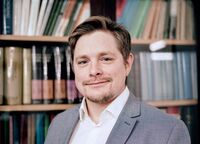 Pavel Hanych (37 years old) studied Protestant theology at Charles University in Prague. For 10 years, he worked at the ECCB Diaconia headquarters, most recently as the Head of the Communication Department and as a Press Spokesperson. He is ordained as an assistant preacher of the ECCB and he also coordinates the publication of the new evangelical songbook. Music is his biggest hobby, he has been pursuing it since childhood. He studied violin at a specialised music primary school. He and his wife Klára are raising a 1.5-year-old son Pavel.
Pavel Hanych (37 years old) studied Protestant theology at Charles University in Prague. For 10 years, he worked at the ECCB Diaconia headquarters, most recently as the Head of the Communication Department and as a Press Spokesperson. He is ordained as an assistant preacher of the ECCB and he also coordinates the publication of the new evangelical songbook. Music is his biggest hobby, he has been pursuing it since childhood. He studied violin at a specialised music primary school. He and his wife Klára are raising a 1.5-year-old son Pavel.
Ecumenical and international relations – that sounds a bit bureaucratic. What exactly can we imagine under that?
From its beginnings, the Evangelical Church has strived for dialogue and a common path of Christians, despite the diversity of traditions and emphases of individual churches. Our job is to help. Firstly, here in the Czech Republic, in our rich but at the same time fragile ecumenical relations. And then abroad, where we have strongly developed partnerships and friendly relations with many churches: In addition to numerous visits, internships, study or work stays, we support each other and share best practices in many areas of church life. And, of course, we do not want to stay only at the borders of the churches, and here I see a third pillar of our work – in relation to the public: to open important social, ethical or political issues, to defend minorities or people on the margins of society. We want the church to be an open and safe place for everyone. In cooperation with the Synod Council and the Media Department, we are thus involved in making our voice heard in this field as well.
You studied theology, prepared for the parish service and, above all, worked for a long time in Diaconia. How did it equip you for your current job?
I definitely like the knowledge of the church environment that I acquired during my studies and while working in various church committees. Ten years in Diaconia was a very precious time, it’s where I learned that even a minority church, actually a very small one, is able to establish an organsation that is one of the leading and respected providers of social services in the Czech Republic and operates even abroad. Although Diaconia has outgrown the Church in many quantitative parameters, it has never strayed from it and is very much in favor of a good relationship with it. Engaging in Diaconia certainly also strengthened my social sensitivity. Despite the progress and the society living in relative peace and wealth, there are still a lot of people, families, children in our country who have a very difficult time in their lives. I learned that even the church should not live in its own social bubble. That it should be open, sensitive, accepting, not judging. That it should act as a safe background even for those who are not mainstream. I've learned that it already works this way at many points at ECCB, but we still need to keep that in mind.
What are the three most important tasks ahead of you now?
Getting to know international relations in times when the world is somewhat closed is not an ideal starting point. We gradually invite foreign partners for online coffee, we meet through monitors and get to know each other informally. Secondly, to record the three areas of our work – internal ecumenism, international relations, society – and to set goals, priorities, to think about how to further develop them. It also takes a lot of time, because in addition to that, we are constantly dealing with the daily executive, which is surprisingly time-consuming even in times of COVID-19. My wonderful colleagues in the team provide great support to me in this. The third task is more personal – in the coming months I would like to move my German to a better level, because in addition to English, it is a key language for many meetings of our department.
Adam Šůra
Czech-American partnership online
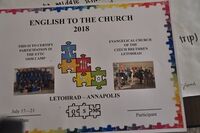 The partnership between the ECCB and the Presbyterian Church in the USA has a long tradition. Many roots reach as far as into the 19th century. At that time, immigrants from the Bohemian Lands founded Czech Protestant congregations in the US. They often maintained close relationships with the evangelicals in their old homeland. Many of these congregations became part of the Presbyterian Church in the United States. During the time of communism and the closed borders, many contacts were broken.
The partnership between the ECCB and the Presbyterian Church in the USA has a long tradition. Many roots reach as far as into the 19th century. At that time, immigrants from the Bohemian Lands founded Czech Protestant congregations in the US. They often maintained close relationships with the evangelicals in their old homeland. Many of these congregations became part of the Presbyterian Church in the United States. During the time of communism and the closed borders, many contacts were broken.
After the Velvet Revolution, relations between the Evangelical Church of Czech Brethren and the Presbyterian Church (USA) took off again. Guests from the USA visited ECCB congregations, groups came to work in the newly founded diakonia, contacts were established between the church headquarters in Prague, Louisville and Kentucky, and there was an exchange between our Evangelical Theological Faculty and various theological faculties in the USA. The outcome of these activities is a network of partnerships between congregations, diakonia and the Evangelical Theological Faculty, all of which are part of the partnership between the ECCB and the PC (USA). There is a group on both sides of the ocean that looks after this partnership. In our church it is the so-called Partnership Working Group, in the Presbyterian Church it is the Czech Mission Network. Both groups have already organised four partnership conferences together: after a first conference in 2008 in Prague, another followed in 2012 in Annapolis, Maryland, then again in Prague in 2016 and in 2019 in Atlanta, Georgia, at Columbia Theological Seminary. The next conference is to take place in Moravia, in Olomouc, from July 9th to 13th, 2023 under the theme: Together on the journey. We expect over 60 representatives from the USA and the Czech Republic to take part in this conference.
The period of restrictions caused by the pandemic became a challenge for this partnership! On both sides of the ocean we have become more and more used to virtual communication. Online meetings and church services became an everyday experience. For many, video conferencing has become an integral part of work, free time and family communication. Therefore, it made sense to try out video communication in our partnership as well. Said and done. On June 16, 2020, for the first time, the two partnership groups met during a joint video conference. And it was an instant success, so that both sides agreed: We'll continue. And not just for ourselves. Twice a year we will organise a two-hour video conference to which we invite all interested parties. The date for the first video conference: Sunday, March 21, 2021 at 2 pm American and 8 pm Central European time. The topic: PRAYER AND PRAISE IN THE PANDEMIC: A Conversation about Worship in the Season of COVID-19. We hope that many people will take part in this conversation. We are planning another meeting for autumn and more for the next few years.
We hope that this format will enable us to open up our partnership further and that more people will be able to participate. Perhaps other congregations or congregational groups could be inspired to join a Czech-American partnership. At the moment the number of partnerships is still below 10. It makes sense to consider more partnerships – after all, there are approximately 10,000 congregations in the Presbyterian Church (USA). In addition to the Presbyterian Church, the Lutheran Church in America and the Church of Scotland are also involved in our partnership network. We are very grateful for these global partnerships that open our eyes to the global dimension of the gospel of Jesus Christ, who sends his disciples all over the world for the gospel to be preached.
Gerhard Frey-Reininghaus
Czech public intrigued by the videos of two YouTube ministers
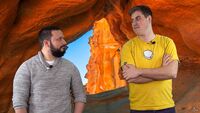 They call themselves the Pastoral Brothers, and apart from their regular work, they also prepare some rather specific YouTube videos. Their names are Jakub Malý and Karel Müller and they are two Protestant ministers from Prague.
They call themselves the Pastoral Brothers, and apart from their regular work, they also prepare some rather specific YouTube videos. Their names are Jakub Malý and Karel Müller and they are two Protestant ministers from Prague.
Their videos, in which they present Biblical themes to the wider public and also comment on public affairs in a satirical manner, have gained much higher numbers of views than the authors had originally expected. They have thousands of followers. Weekly, their videos are viewed by as many as tens of thousands of people and they have certainly managed to reach far beyond the borders of the „seniorate“ (parish), or of the whole Evangelical Church of Czech Brethren, for that matter.
It should be noted that the idea of making videos for youth was a spontaneous one and it was not motivated by a desire to actually become a couple of YouTubers. It was more of a crazy decision than of a specific, well thought-through plan. They simply wanted to give it a try. They said they had felt for a long time that the church lacked a communication channel that the young generation could relate to. However, neither Jakub nor Karel had any real experience making videos.
The beginnings were hard, but you could always tell that they were enjoying the work. „We like thinking about how to spread Christian content in a humorous way. We’re constantly learning new things – from writing screenplays to actually producing a video,“ say the Pastoral Brothers.
After a year on YouTube, as they started gaining more fans, they applied, through the ECCB, for a subsidy from Scotland. „We received approximately 200 thousand CZK, which we used to buy semi-professional technology, software, we paid for a graphic presentation, and being promoted on social networks. This was a significant step further,“ describes Karel.
The spring of 2020 saw a breakthrough for the Pastoral Brothers. The Czech Republic was dealing with the first wave of the pandemic and the government was introducing extraordinary measures that basically brought social and cultural life in the country to a halt. In a traditionally atheist country, however, the government kept ignoring churches and spiritual services.
The situation was almost absurd: while hobby markets and circuses were gradually reopening, Sunday services at churches were forbidden or subject to tough measures. That was when the couple of YouTube pastors came to the attention of the media.
They made a video in which they were walking around a Hornbach shop and discussing the possibility of organising Sunday services at a shopping centre. This made them one of the most-watched documentary shows in the country. The restrictions imposed by the government made it possible to have tens of thousands of people shopping, but strictly forbade a handful of people gathering in a spacious church. This was a comprehensible way of exposing how ridiculous the situation was even in a country where only a minority of people actually go to church.
In their usual videos, Karel and Jakub strive to present the Biblical message even to people who have never heard of it before. They have, for example, dealt with the Ten Commandments, ethical questions of life, they have prepared youth Sunday services during lockdowns, they have even made a series of videos in which they tried to explain some rather bizarre Biblical passages that may take a lay reader of the Bible by surprise.
From the very beginning, they were also wondering about how to efficiently step out of online space and be able to reach out to all the seekers out there – in real life, not only through screens and displays. „We opened a Christianity course. The capacity was full in two hours,“ says Karel, remembering the summer of 2020, when the governmental restrictions were eased and it was once again possible to meet face to face. „We’ve stayed in touch with these people, some of them are even planning to get baptised. In the future, we would like to organise low-threshold Sunday services for our fans. We are also working on a book that will present the basic ideas of Christianity in a comprehensible manner. It should be published in a non-Christian publishing house that contacted us with the idea.“
They have also started preparing a podcast, in which they interview lecturers from the Protestant Theological Faculty of the Charles University, providing in-depth analyses and debates on the issues of faith and of the Biblical message. They also focus on interreligious dialogue and talk to respected representatives of various religions, or important public personalities. Their guests included, among others, theologian and Templeton prize winner Tomáš Halík or one of the leading Czech economists and a former Václav Havel aide, Tomáš Sedláček.
Karel and Jakub say they are still surprised by how much interest is being shown by people from ecumenical relations as well as people who have nothing in common with the church. The original intention was to make videos for Protestant youth, but they are being watched by people up to age 45 from various denominations, and even people that do not declare themselves as belonging to any religion.
The Pastoral Brothers have become influencers. The media, as well as other members of the YouTube community, request them for interviews. They have been spotted several times on nationwide TV and radio. They were featured in the „30 Under 30“ selection of influential Czech personalities of the Forbes magazine in 2020.
Surprisingly perhaps, neither Jakub nor Karel grew up as churchgoers. They only discovered faith gradually, at high school. Shortly after, they decided to study Theology and started serving the church. In addition to this, Karel also teaches ethics at one of the schools of the Evangelical Academy. In the regions where they live, they mostly focus on working with the local youth and as soon as the pandemic situation improves a little bit, they want to start their “live” courses of Christian faith again.
They refer to themselves jokingly as the best YouTubers among pastors and the best pastors among YouTubers. Since this year’s spring, they have been working on a show that should air on one of the biggest digital tv channels in the Czech Republic.
Jiří Hofman
DIACONIA OF THE ECCB
 Belgická 22, CZ 120 00 Praha 2, Czech Republic
Belgická 22, CZ 120 00 Praha 2, Czech Republic
Tel: (+ 420) 242 487 811 (812); Fax: (+420) 242 487 834
E-mail: info@diakonie.cz
Web page: www.diakonie.cz
The Diaconia of the Evangelical Church of Czech Brethren (ECCB) is a Christian non-profit organisation that offers help and support for living a dignified and full life despite age, illness, disability, isolation, difficult social situations or other forms of crisis situations that occur in life. The services of the ECCB’s Diaconia are based on the message of the Gospel about the Love of our Lord and the example that Jesus Christ has given us in serving others. In its centres and special educational facilities, the ECCB’s Diaconia offers social and educational services, healthcare, and ministry. It is the second largest non-governmental organisation providing social services in the Czech Republic.
You have to be a bit of a fool not to lose hope
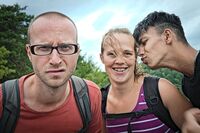 My interview with Pavel Novák, head of Diaconia’s low-threshold clubs in Jablonec nad Nisou, took place on-line, like most things do during these difficult times. However, despite not meeting in person, we did get to see and hear each other, and our meeting made me feel quite certain that Pavel Novák was the right man for this job. I’m sure the Roma people, “his Gypsies”, trust him.
My interview with Pavel Novák, head of Diaconia’s low-threshold clubs in Jablonec nad Nisou, took place on-line, like most things do during these difficult times. However, despite not meeting in person, we did get to see and hear each other, and our meeting made me feel quite certain that Pavel Novák was the right man for this job. I’m sure the Roma people, “his Gypsies”, trust him.
When the almost forty-year-old Pavel Novák graduated from the Jan Evangelista Purkyně Pedagogical Faculty in Ústí nad Labem (previously having studied the Semily high school), he immediately joined the ranks of the ECCB Diaconia’s employees. He never started work in the field he studied. Pavel Novák and his family live in Vysoké nad Jizerou, he has three children aged six, five and three, named Vilemína, Hubert and Felix. He says they gave their children interesting names to contrast with the ordinary surname.
Did you ever consider becoming a teacher at all?
I knew I wanted to work with young people, but I didn’t manage to find a job as a teacher anywhere near my home. And as it happened, in 2009, Diaconia opened a new low-threshold centre for children and youth in Jablonec, I was intrigued. And they hired me.
As a teacher, with no experience for that matter, don’t you need to go though some training before you start working at a social facility? You didn’t need to pass any exams?
It is true that formally, I wouldn’t actually be allowed to be performing the job of a social worker. I had to take a social worker retraining programme, organised by the Czech Streetwork association back then. The programme focused on working at low-threshold facilities and taught me a lot of useful information. For example, I learned how to position clients :-).
At Diaconia, you are manager of the club. Does that mean that you spend most of your time on office work, or do you also get to be with the kids?
I do both, but I certainly spend more time with the clients. I am the manager of two low-threshold clubs and at the same time I am a contact worker for a club named Kruháč.
The topic of this issue of the Bulletin is “Hope”. It is a word we often use and talk about, but can it actually help us in real life? Can it support and carry us? Is it the same thing as meaningfulness?
I don’t want to sound melodramatic, but I do believe that you couldn’t do this job without the feeling of hope; I really do consider it a basic prerequisite. Proof? Throughout the course of the eleven years that I’ve worked here, a number of colleagues came and went. They came speaking about their will to help, but this will dried up after some time – and they left. Others, in the meantime, did not lose their will. It is the framework of hope that gave them the power to keep going. I should probably add that one must be a bit of a “fool” not to give up.
What do you mean?
On a daily basis, my hopes are frustrated in one way or another. The plans I make don’t work out; people that we’ve been helping for years and whom we considered “hopeful cases” disappear who knows where… That’s what I mean when I say you need to be a bit of a fool. Your hope must be unattached, independent, it needs to stand over and above all else.
Having mentioned this context, how do you feel at work? What is it like, living like a “fool”?
It’s actually quite good. You are never bored, the job is always a bit of an adventure. The young people we work with are very specific personalities and their behaviour is often surprising. And because of how they act and who they are, they often get into trouble.
What does your regular working day look like?
First of all, my usual day has rather unusual working hours: we start at 10 and finish at 6:30 pm. I am not very happy about that, as I get home quite late. In the morning, I do administrative work – there’s plenty of it – individual plans, contracts, preparation and so on. Then from 1 to 6, our clients arrive. We usually have about thirty per day.
Can you tell me what sort of things happen during the afternoon?
It depends on the clients’ age. In terms of legislation, we have a very wide age limit: from six to twenty-six. However, most clients are under 20. They are Roma children and youth. We offer a good alternative to them spending their free time in the street. The younger ones seek entertainment. You need to get them intrigued, otherwise they wouldn’t come. Mind you, we actually help them with their schoolwork. The older ones usually have a specific issue they want to discuss. What I find alarming is that in the last approximately three years, we have had increasing numbers of people that are facing existential problems in spite of their very young age. They are often between 18 and 20… We accompany them when they are seeing authorities, we help them find a job, a place to live, we discuss their personal issues. In addition to that, we also do fieldwork, directly in the streets.
Working in the streets… how do people feel about this?
As I said, we are seen as somewhat crazy. However in the places where we work, people are familiar with our activities and they are used to us being around. We need to stick to the hope that there is meaning in what we do, even though it can look a bit foolish sometimes. When working in the streets, we sometimes bump into somebody we already know and lost track of at some point. Another benefit is that this a form of screening – actively searching for potential clients. I think I can say we are quite good at this: we are not intrusive, I suppose people can somehow relate to us – judging by the fact that they tend to like us. We already have our methods on how to behave in order not to look like street vendors or guys that surprise you with aggressive offers.
How are you dealing with the current situation caused by the COVID-19 pandemic? Things
are a bit upside down, our clients come in small groups or individually. As far as fieldwork is concerned, our screening activities have partially moved to social networks. You could say the activities that would normally be taking place on the street or in our club are currently happening on Facebook.
You seem to enjoy your work for the most part, holding on to your “hope in spite of everything”. Is there anything that has the potential to shake this hope from time to time?
For example, it is not rare that something disappears in our centre. Somebody steals it, to put it plain and simple. That is something we need to count on. Usually, the culprit is a new client. Or somebody who gets into really big trouble. Sometimes, this is done by someone who wants to take revenge.
Why would they want to take revenge?
There are certain things that our kids enjoy, but we also require that they stick to some rules, which is not as much fun and it is often something they had not been confronted with before. When they don’t respect these, there are various sanctions that follow. For example, they may be banned from entering the club – for a day, sometimes for a longer period of time. So they get angry and want to punish us… and they grab something as they leave. How do we find out who did it? Often, the culprit stops coming to the club from that day on. However, we don’t take these things too seriously. These people often have nothing to eat and nowhere to sleep. So really, this doesn’t get my hope shaken all that much.
If this hope is over and above us, independent, isn’t it also a bit theoretical? Does it show in any specific, tangible ways? Do you get praised sometimes? Are there any visible successes?
There certainly are. The kids do give us a certain form of feedback; it isn’t necessarily praise, but they remind me, for example, “Pavel, I learned this from you”, which would please anybody. It’s like a spice, without which your food would be dull. And once again, I must bring up the topic of foolishness: things don’t work out forty times in a row, but when the 41st person comes, I don’t say to myself that the same scenario will repeat and that my work is pointless. I start from zero, as if this person was my first client.
Could you give us an example?
We have many young people who start to be sexually active at a very young age. They are fifteen or sixteen, boys and girls. We are aware of this and come up with tons of prevention-focused activities; we discuss these issues, we talk about planned parenthood, contraception. They seem to understand and we get the impression that our activities have been meaningful. And then a fifteen-year-old dives headlong into these adventures, with all the consequences. For me, this is the 41st person. On the other hand, I must point out that when preventative work is done well, the result is that “nothing happens”. We find out that so and so did something or something happened to him/her, but we never find out what would have happened if we hadn’t done anything. And my guess is, things could usually have been much worse. It isn’t easy to estimate the impact of our work. In addition, our clients often disappear out of sight and we never find out how their journey continued and what influence our activities had. A friend simply tells us that so and so has moved to Canada.
Does the 41st person prove that if I am foolish enough, there is always hope?
Yes. I will always keep trying, regardless of whether my work proves useful, regardless of the prospect of failure. I won’t be discouraged. When we talk about these situations with our colleagues at work, mentioning all these failed attempts, we have a good laugh. We laugh at ourselves, not the clients! Why focus on always trying to find meaning in everything? Of course we monitor our results, we need to fill out various statistics in our reports. But this is not what drives us, and it has nothing to do with the energy we put into our work.
In spite of all this, don’t you ever feel like quitting?
There are many things that annoy me, of course. But this has nothing to do with my clients. This has to do with how society views us and how much/how little they support us. What the social mood is. Sometimes I can’t believe the decisions the authorities make, concerning the existence of our club. But I don’t feel like quitting, no. I would rather go on being a fool.
Using slightly lofty language, where do you see yourself in five years? Do you want to continue with your job?
Yes. It is not very lofty, but that’s the way it is.
Jana Plíšková
PROTESTANT THEOLOGICAL FACULTY OF CHARLES UNIVERSITY (PTF CU)
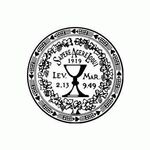 P. O. Box 529, Černá 9,
P. O. Box 529, Černá 9,
CZ 115 55 Praha 1, Czech Republic
Tel: (+ 420) 221 988 211; Fax: (+ 420) 221 988 215
E-mail: intl@etf.cuni.cz
Web page: http://web.etf.cuni.cz/ETFENG-1.html
The Protestant Theology Faculty of Charles University (PTF) is the successor of the Jan Hus Faculty (1919–1950) and the Comenius Faculty (1950–1990). In the year 1990 it was incorporated into Charles University. The administration of the Faculty is directed by a Dean and a board of Vice-Deans, elected for a four-year term of office. The Faculty offers study programmes at Bachelor's and Master's level in Protestant Theology, Diaconia (Pastoral and Social Work), and Ecumenical Studies, and at doctoral level in various theological fields. The faculty is ecumenically open to all. Pastors of the ECCB receive their theological education here.
Course for hospital chaplains at ETF UK
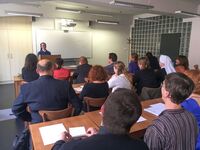 On Friday, December 4th, 2020, the ceremonial closing of the fifth cycle of the "Hospital Chaplain" qualification course took place at the Evangelical Theological Faculty of Charles University. The 310-hour course is organised by the ETF in cooperation with the Catholic Theological Faculty of Charles University, the Association of Hospital Chaplains of the Czech Republic and individual churches in the Czech Republic. Successful completion of the course is one of the conditions for the work of clergy in medical facilities.
On Friday, December 4th, 2020, the ceremonial closing of the fifth cycle of the "Hospital Chaplain" qualification course took place at the Evangelical Theological Faculty of Charles University. The 310-hour course is organised by the ETF in cooperation with the Catholic Theological Faculty of Charles University, the Association of Hospital Chaplains of the Czech Republic and individual churches in the Czech Republic. Successful completion of the course is one of the conditions for the work of clergy in medical facilities.
Half of the twelve graduates already works in hospitals, the others are getting ready and gaining experience. The theoretical and practical parts are connected as much as possible, so that the chaplains can contemplate their work and their attitudes in medical facilities while facing various situations – in relation to patients, their loved ones and hospital staff. Therefore, they attend courses in the field of medical law or ethics, as well as special pastoral care and management. A total of three 1-week internships, which the chaplains complete in three different hospitals under the guidance of experienced chaplains, are a great learning experience of both communication and self-knowledge.
One of the important and valuable aspects of the course is ecumenical cooperation. Both the course instructors and the practice leaders represent at least three churches with the participants themselves being from five different churches. There is no doubt that in our country, ecumenical cooperation between churches, but also the ability to communicate with people of other religions and people who profess no faith, is a basic condition for chaplain's work. As well as the art of cooperation in multidisciplinary teams. The course provides invaluable experience for this.
Like all other education, the course was marked by the situation regarding COVID-19. Nevertheless, the experience of teaching online, new opportunities for pastoral work, conversations with people working in health care, and supportive interviews with patients who do not have the opportunity to visit – all of these showed the importance of chaplaincy and added a new dimension to the course. And we are already looking forward to another cycle.
Ladislav Beneš, Dr., Department of Practical Theology, ETF UK
Bachelor Studies at PTF
 The Protestant Theological Faculty of the Charles University in Prague is now offering not only a Master study programme in English, but also a Bachelor study programme. One of the reasons for opening the Bachelor programme in English was that the applicants for the Master programme often didn’t meet one of the conditions, namely the completion of classical languages.
The Protestant Theological Faculty of the Charles University in Prague is now offering not only a Master study programme in English, but also a Bachelor study programme. One of the reasons for opening the Bachelor programme in English was that the applicants for the Master programme often didn’t meet one of the conditions, namely the completion of classical languages.
The Protestant Theology Bachelor study programme focuses mainly on a basic knowledge of theology and its systematic, historical and cultural dimensions. The graduates are capable of working with Biblical texts in their original languages, with the help of current specialised methods. They have basic skills in the field of the understanding and interpretation of texts (especially those belonging to the Christian tradition), and are capable of interpreting them in their relevant literary, historical and ideological contexts.
Particular attention is paid to acquiring a knowledge of the major world religions, philosophical thinking, Christian ethics and ecumenical issues.
Graduates are prepared for further academic work and the study of post-bachelor programs in the corresponding field. Graduates can also successfully enter the labour market in fields where an education in the humanities is required and a knowledge of value-based thinking and religious issues is an advantage, e.g. in the educational, cultural and humanitarian fields.
If you want to learn more, please visit our web page: etf.cuni.cz
Kristýna Kadlecová
Trip to Terezín
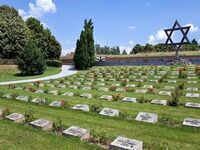 On Tuesday the 15th of December 2020, the International Department of the Protestant Theological Faculty organized a trip for the foreign students of the Faculty to the former Ghetto and concentration camp in Terezín (Theresienstadt). This might look like a rather unusual activity for the time of Advent, but these days provided the best conditions for meetings in groups as far as the COVID-19 restrictions were concerned. We even had an opportunity to ask our friends and colleagues from other Faculties to join us.
On Tuesday the 15th of December 2020, the International Department of the Protestant Theological Faculty organized a trip for the foreign students of the Faculty to the former Ghetto and concentration camp in Terezín (Theresienstadt). This might look like a rather unusual activity for the time of Advent, but these days provided the best conditions for meetings in groups as far as the COVID-19 restrictions were concerned. We even had an opportunity to ask our friends and colleagues from other Faculties to join us.
As a German, I personally consider an encounter with such a place an indispensable experience for myself and every student. Terezín in particular is reminiscent of the deviousness and mendacity of the Nazi regime in its dealings with the Jewish people, its behaviour towards the prisoners themselves, the population of the area and the global general public. An introductory lecture, several exhibition locations and an expert guided tour through the Ghetto, the cemetery and the Gestapo prison showed us the extent of the unscrupulous brutality with which thousands were penned up or sent on to the gas chambers in Eastern-European camps. For me, the moment that left the strongest impression was when we visited the morgues and the crematorium. Even after death, there was no respect for the dignity of the people, whose bodies were burnt in conflict with the practice of religion and the ashes were later scattered into the river to cover up the number of the departed. This place seemed like a scream to which I have no answer, but hopefully the coming Saviour…
We thank Věra Fritzová and Kristýna Kadlecová for organising this venture under difficult conditions. Although it was almost overflowing with information, it will be remembered as a significant part of our semester.
Michael Klein, Germany, student at the Protestant Theological Faculty in Winter Semester 2020
